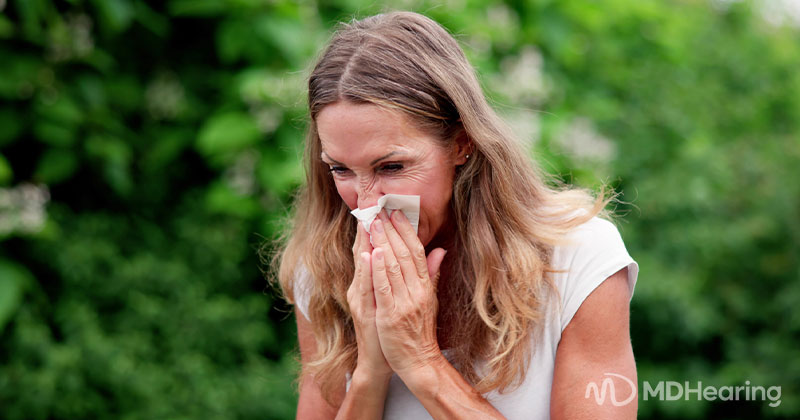Spring is in the air—and so is the pollen. While the new season brings warmer weather, blooming flowers, and longer days, it also brings a not-so-welcome guest: allergies.
If you’re one of the 25% of adults in the U.S. (65 million people) who experience seasonal allergies, you’ve likely dealt with the influx of sneezing, itchy eyes, stuffiness, or headaches. But did you know that spring allergies can also impact your hearing?
Here’s how seasonal allergies can affect your ears, your hearing, and even your hearing aids—and what you can do to stay ahead of them.
Why Do Spring Allergies Happen?
When temperatures rise and plants begin to bloom, pollen particles from trees, grasses, and flowers are released into the air. For those with seasonal allergies (also known as hay fever or allergic rhinitis), the immune system sees this pollen as a threat and releases histamines to fight it off.
How Do Spring Allergies Affect Hearing?
Your immune system’s response to pollen leads to a number of symptoms, which most people think of as sneezing, sinus pressure, runny nose, or itchy eyes. But your ears and sinuses are connected, and allergies can also affect your hearing in unexpected ways. Let’s explore:
Clogged Eustachian Tubes
The ears, nose, and throat work as an interconnected system. Eustachian tubes connect the middle ear to the back of your throat and the nasal cavity, specifically the area called the nasopharynx.
Eustachian tubes play a vital role for ear health. They equalize pressure in your middle ear, drain any fluid that builds up, and help protect the middle ear from infections. When there’s a blockage of the Eustachian tube, it can’t work like it should. This can happen from a cold, sinus infection, or the focus of this blog—allergies.
Eustachian tube blockage can result in:
Pressure or fullness in your ears
Ear pain or discomfort
A popping or crackling sound
Muffled hearing
Ear infections
Conductive Hearing Loss
When fluid builds up or your middle ear becomes inflamed due to blocked Eustachian tubes, it can result in conductive hearing loss—a form of hearing loss that occurs when there’s a blockage in the middle or outer ear that prevents sounds from reaching the inner ear. It might sound like you’re underwater or like your ears won’t “pop.”
The good news? This type of hearing loss is usually temporary and clears up once the underlying allergy symptoms are treated.
Increased Tinnitus Symptoms
Tinnitus—the ringing, buzzing, or humming in your ears—can worsen when your allergies are acting up. The inflammation and fluid buildup in the middle or inner ear may increase pressure on sensitive structures, potentially contributing to tinnitus symptoms.
If you wear hearing aids with tinnitus masking features, you may notice a greater need for them during peak allergy season. These features are designed to stimulate your auditory system and soften the constant noise of tinnitus, making it easier to focus on conversations and everyday sounds.
Meniere’s Disease Flare-Ups
If you live with Meniere’s disease, you may notice a flare-up during allergy season. Meniere's disease leads to an excess buildup of inner ear fluid, which increases pressure and causes the endolymphatic chambers—structures that help regulate ear pressure—to swell or bulge.
Because spring allergies can increase fluid retention and inflammation in the inner ear, Meniere’s symptoms may worsen as a result, such as:
Sudden hearing loss
Dizziness or vertigo (imbalance or spinning sensation)
Ear pressure
Tinnitus (ringing in the ears)
How to Overcome Allergy-Related Ear Issues
Fortunately, there are several ways to reduce allergy symptoms and protect your hearing during the spring season:
Use antihistamines or decongestants (with your doctor’s guidance) to reduce inflammation and mucus production.
Try a saline nasal rinse to clear pollen from nasal passages.
Stay indoors on high pollen days, especially in the morning when pollen counts are highest.
Use an air purifier and keep windows closed to reduce indoor allergens.
See an allergist if symptoms are severe or persistent—they may recommend allergy testing or immunotherapy (allergy shots).
Remember that these are general suggestions, and may not work for everyone. Always consult your doctor before taking any over-the-counter or prescription medications.
Don’t Forget Your Hearing Aids
Spring’s higher humidity, increased sweat, and fluctuating temperatures can affect how your hearing aids perform. Here’s how to protect them:
Clean your hearing aidsregularly: Allergies cause more earwax buildup, which can clog microphones, receivers, wax guards, ear tips, and other hearing aid parts.
Keep your hearing aids dry: Use a hearing aid dehumidifier overnight, especially after rainy days or exposure to moisture.
Wipe your hearing aids daily: Use a microfiber cloth or soft tissue to remove sweat, oil, pollen, or other debris that may collect on the device.
Replace partsas needed: Change out your tubing, tips, and/or wax guards more often if you’re experiencing an increase in earwax production.
Taking care of your hearing aids during allergy season ensures better performance and prevents damage.
Final Thoughts
Allergies don’t just make your eyes water and your nose run—they can also affect your hearing health in a big way. If you're noticing changes in your hearing during allergy season, you're not imagining it. From Eustachian tube blockages to tinnitus flare-ups, your ears are just as sensitive to seasonal shifts as the rest of your body.
By managing your allergy symptoms and giving your hearing aids a little extra TLC, you can enjoy the beauty of spring without missing a beat.
High-quality, affordable hearing aids designed to help you stay connected—no matter the season.
BROWSE HEARING AIDS

